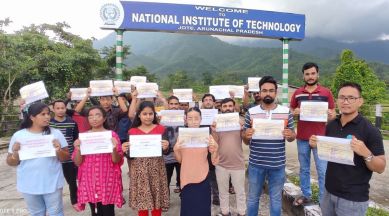‘Research pays better abroad, need 60% hike in fellowship,’ say protesting PhD scholars
On Friday, researchers across centrally-run institutions participated in a nationwide peaceful protest called by the All India Research Scholars Association (AIRSA) to register their unhappiness with the 20 per cent hike implemented by the union government.

— Ishita Roy
According to the revision announced by DST on June 22, a junior research fellow will receive Rs 37,000 monthly, up from Rs 31,000, and a senior research fellow will receive Rs 42,000, up from Rs 35,000. The last revision was made in 2019.
Around 3 pm on Friday, PhD scholars across universities joined in a peaceful protest rejecting the 20 per cent hike by the DST. Speaking to The Indian Express, AIRSA President Lal Chandra Vishwakarma, a former PhD scholar from All India Medical Sciences (AIIMS), Delhi said, “We aim to convey that Indian scholars are not satisfied with this hike. Our objective through this protest is to promote dialogue and discuss the matters of research scholars.”
Apart from the 60 per cent hike in fellowship stipend, the protest also aims to raise issues such as the automatic revision of fellowships every four years, the revision of the non-NET fellowship, regular disbursement of fellowships, and the need for robust infrastructure for research. Researchers from Indian Institutes of Technology (IITs), National Institutes of Technology (NITs), All India Institute of Medical Studies (AIIMS), and Jawaharlal Nehru University (JNU) participated in the peaceful protest.
“A 60 per cent hike is not a vague number; it is very well calculated as per the inflation, and we are not ready to bargain. As research scholars, we do not have specified working hours, we put a lot of effort into our research, and a 20% hike is not enough,” said Harshita Makkar, a PhD scholar at AIIMS, Delhi. “We get a better work environment abroad. If this continues, all research scholars would be forced to go abroad. Working here is a brain drain,” Makkar said.
Pranesh Kumar Singh, a PhD scholar at NIT Arunachal Pradesh said, “Stipends are not released regularly. Our demands are simple, we want a 60 per cent hike in the fellowship and regularity in our stipends.” The irregularity in the release of stipends has been persistent, Ankita Rawat, a PhD scholar at JNU told this newspaper. “When I applied, my initial stipend was delayed by six months. Even now, I get my stipend once every two months,” Rawat said.
Many students also took to Twitter or did not go to their labs on Friday to register their dissatisfaction. “We are participating in the nationwide strike by not attending our labs,” said Ahinur Islam, a PhD scholar at the North Eastern Hill University, Shillong.
Speaking on the issue of the non-NET fellowship that has not been revised since 2006, Pragya, a PhD scholar at the Central University of Jammu said, “The non-NET students are suffering. How can you expect us to do the same work as a Junior Research Fellow (JRF) when we receive only Rs 8000 a month? Apart from the research, we also have rent to pay.”
“The infrastructure at my campus is not enough. We do not have hostels here; our libraries do not have books. We spend more than the stipend we get. How can we survive on just Rs 8000?” said Vijay Shankar Choudhary, a PhD scholar at the Mahatma Gandhi Central University (MGCU), Bihar. Choudhary told The Indian Express that after July 5, PhD scholars of MGCU will take this issue to the Vice-Chancellor and approach the University Grants Commission (UGC). “Due to the vacation, MGCU students are protesting online, once the college reopens, we will write to the UGC,” said Choudhary.
Earlier on June 22, AIRSA had reached out to the DST, requesting a meeting to discuss the demands of research scholars. AIRSA also approached the UGC on 25 June. The associated hasn’t heard from them yet. “We will continue the protest until our demands are heard,” said V Ramvilas Pashwan, a PhD scholar Indian Agricultural Research Institute and the President of the Post Graduate Students’ Union.